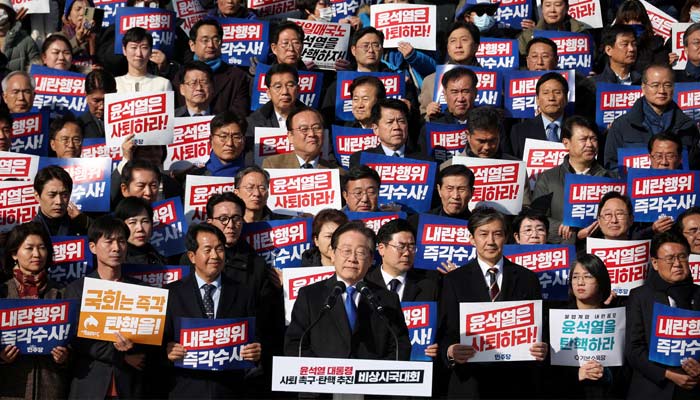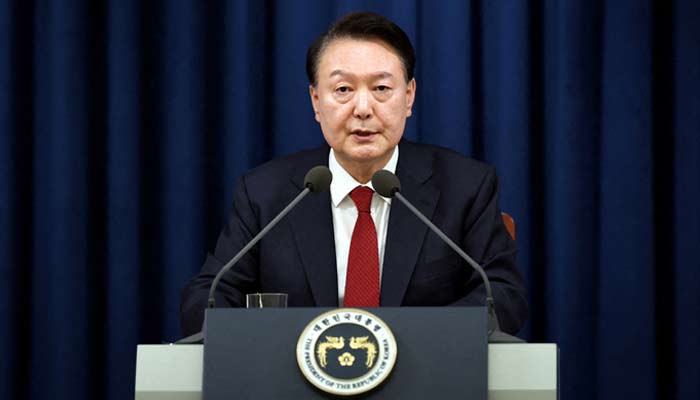
- Yoon backs down in the confrontation with lawmakers.
- The United States expresses its deep concern about martial law.
- Demonstrators celebrate in front of the Parliament building.
South Korean lawmakers called on Wednesday for President Yoon Suk-yeol to be held accountable after he declared martial law, but he retracted the move hours later, sparking the biggest political crisis in decades in Asia’s fourth-largest economy.
The surprise announcement late Tuesday sparked a confrontation with Parliament, which rejected his attempt to ban political activity and impose censorship on the media, while armed forces stormed the National Assembly building in Seoul.
A coalition of lawmakers from opposition parties said they intend to propose a bill to impeach Yoon on Wednesday, which must be voted on within 72 hours.
“Parliament should focus on suspending the president immediately to pass the impeachment bill as soon as possible,” Hwang Eun-ha, a coalition lawmaker, told reporters.
A presidential official said Yoon’s chief of staff and senior secretaries had offered to resign en masse.
Yoon told the nation in a television address that martial law was necessary to defend the country from nuclear-armed North Korea and anti-state forces loyal to North Korea, and to protect its free constitutional order, although he did not mention specific threats.
Chaotic scenes followed as soldiers wearing helmets climbed into the parliament building through shattered windows and military helicopters flew overhead. Parliamentary aides sprayed fire extinguishers to keep the soldiers away, and demonstrators clashed with police outside.
The military said the activities of parliament and political parties would be banned, and that media outlets and publishers would be under the control of the martial law leadership.

But within hours of the announcement, South Korea’s parliament, with 190 of its 300 members present, unanimously approved a motion demanding the lifting of martial law, including all 18 members of Yoon’s party present. The president then canceled the announcement.
The demonstrators outside the National Assembly chanted and clapped. “We won!” They chanted, and one of the demonstrators beat a drum.
More protests are expected on Wednesday as South Korea’s largest union coalition, the Korea Federation of Trade Unions, plans to march in Seoul and vow to strike until Yoon’s resignation.
The US Embassy urged US citizens in South Korea to avoid areas where protests are taking place, while some major employers advised employees to work from home.
Financial markets were volatile, with South Korean stocks falling about 2% early Wednesday, while the Korean won (KRW) stabilized to trade at around 1,418 against the dollar, after falling to its lowest level in two years.
Finance Minister Choi Sang-mok and Bank of Korea Governor Ri Chang-yong held emergency meetings overnight and the Finance Ministry promised to support markets if necessary.
“We will inject unlimited liquidity into stocks, bonds, the short-term money market as well as the foreign exchange market for the time being until they fully return to normal,” the government said in a statement.
South Korean foreign exchange authorities are suspected of selling US dollars in the local market early Wednesday to limit the won’s decline, two traders said.
Dodged a bullet
The main opposition Democratic Party called on Yoon, who has been in office since 2022, to resign or face impeachment over the declaration of martial law, the first of its kind in South Korea since 1980.
He added: “Even if martial law is lifted, he cannot avoid treason charges. It has been clearly revealed to the entire nation that President Yoon can no longer run the country normally. “He should step down,” Park Chan-dae, a senior Democratic Party lawmaker, said in a statement.
The National Assembly can impeach the president if more than two-thirds of lawmakers vote in his favour. The Constitutional Court then holds the trial, which it can confirm by a vote of six of the nine judges.
Yoon’s party controls 108 seats in the 300-member Legislative Council.
If Yoon resigns or is removed from office, Prime Minister Han Dak-soo will take over as leader until new elections are held.
“South Korea as a country dodged a bullet, but President Yoon may have shot himself in the foot,” said Danny Russell, vice president of the US-based Asia Society Policy Institute.
The crisis in a country that has been a democracy since the 1980s, a US ally and a major Asian economy, has caused international concern.
US Secretary of State Anthony Blinken said he welcomed Yoon’s decision to cancel the martial law declaration.
“We continue to expect political differences to be resolved peacefully and in accordance with the rule of law,” Blinken said in a statement.
South Korea hosts about 28,500 American soldiers as a legacy of the 1950-1953 Korean War.
Scheduled defense talks and joint military exercises between South Korea and the United States have been postponed Yonhap The news agency reported.
A spokesman for the Swedish Prime Minister said that he had also postponed a visit to South Korea.
Yoon, the prosecutor, won the closest presidential election in South Korea’s history in 2022, riding a wave of discontent with economic policy, scandals and gender wars.
But he was not very popular, with his approval ratings hovering around 20% for several months.
His People Power Party suffered a crushing defeat in the parliamentary elections that took place in April this year, ceding control of the unicameral parliament to opposition parties, which captured nearly two-thirds of the seats.
More than a dozen instances of martial law have been declared since South Korea’s founding as a republic in 1948.
In 1980, a group of military officers led by Chun Doo-hwan forced then-President Choi Kyu-hah to declare martial law to crush calls from the opposition, workers and students to restore democratic government.
